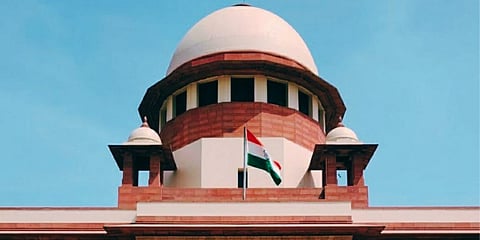

Counsel for respondents defend the EWS criteria on the ground that the state has an obligation to address poverty.
—-
THE Solicitor General of India, Tushar Mehta strongly defended the validity of the Constitution (One Hundred and Third Amendment) Act, 2019 that provides for a 10 per cent quota to economically weaker sections ('EWS') of citizens in admission to educational institutions, including private educational institutions. The petitions challenging the amendment are being heard by a five-judge Constitution Bench comprising the Chief Justice of India U.U. Lalit, and Justices Dinesh Maheshwari, S. Ravindra Bhat, Bela Trivedi and J.B. Pardiwala.
Mehta submitted that the amendment not only does not destroy the basic structure but strengthens it by giving economic justice. He argued that the constitution is a living and not a static document. By pointing out that India has the largest percentage of the young population, Mehta contended that some affirmative action is needed for that class.
On the question of what is the 'basic structure', Mehta was of the opinion that the Preamble is the guide.
Citing the judgment in Kesavananda Bharati versus State of Kerela (1973), Mehta said, "The Equality code can be legislatively touched upon if otherwise, it does not destroy the basic structure. It is an elastic concept and not a static concept." He further added that "If society changes, and if people want something more, more provisions can be considered without disturbing the fundamentals". According to Mehta, the EWS amendment passes the test of changing times.
Relying on the Kesavananda Bharati case, Mehta added, "Unless it is shown that the amendment fundamentally alters the basic structure, it cannot be struck down." On this, Justice Bhat observed that although federalism is not mentioned under the Preamble, the Kesavananda Bharati case identifies federalism as a basic feature of the Constitution.
Further, Justice Bhat questioned whether the basic principle of equality is violated if the SCs/ST/OBCs are excluded from the economic criteria.
The CJI added that there is a sense of permanency with the reservation on the basis of lineage, caste, and creed, which is passed down from generation to generation. Economic conditions are temporary, he observed.
Mehta submitted that SEBC lacks permanency with no fixed guidelines regarding the creamy layer, which is excluded from benefiting from it. The numerical figure of Rs. 8 lakhs was arrived at to exclude the creamy layer after a detailed study with fixed parameters, Mehta added. To this, the Court replied that the quantification of the EWS category lacks methodology or guidelines.
The Court compared those belonging to the EWS from the SC/ST category with those belonging to the EWS from the 'forward class' category. Justice Bhat pointed out that with a huge percentage of the poorest of the poor belonging to the SC/ST category, a large section will be excluded by the amendment in question. "Is this a view of our egalitarian constitution?", Justice Bhat asked.
Senior advocate S. Niranjan Reddy, appearing for the State of Andhra Pradesh argued in defence of the amendment. He submitted that reservations cannot be a part of the basic structure because reservations are only one of the modes of addressing social inequality, and it is permissible for the state to look for other modes to address inequality. "Reservations are of temporal or transient nature, and cannot be the basic nature of the constitution.", Reddy contended.
Reddy submitted that reservations by their very nature are exclusionary. "With vertical reservations for the economically weaker sections being created, whoever has been already provisioned for will, therefore, be kept out of that further reservation", he added. To this, the Court observed, "The common notion is, no reservation means anybody and everybody is able to compete".
According to Reddy, the reasonable classification and the exclusion criteria are for the social good, to help another depressed section.
Senior advocate Vibha Makhija, appearing by way of an intervention application for persons who fall in the EWS category and a beneficiary, submitted that the 103rd amendment falls within the four corners of the Constitution.
Makhija contended that poverty is the most debilitating factor. To this, the CJI observed, "There are no anthropological studies to show that families who do not belong to certain regions have suffered poverty from generation to generation." The status of a family which is poor lacks permanent status, the permanency is attained when one is born, for instance, in a family of SC, which is stigmatic and will get translated through generations, the CJI added.
Makhija argued that the change in time and the reservations of the backward classes have led to their upliftment and development. "Traditionally if we have addressed only caste-based backwardness, does our Constitution stop us from addressing non-caste based backwardness?", she questioned. Our founding fathers would have wanted to expand their rights and empower them, she added.
Makhija further contended that under international law and treaty obligations, India is bound to address poverty. Further, she submitted that Article 253 of the Constitution provides for enacting legislation to give effect to international agreements.